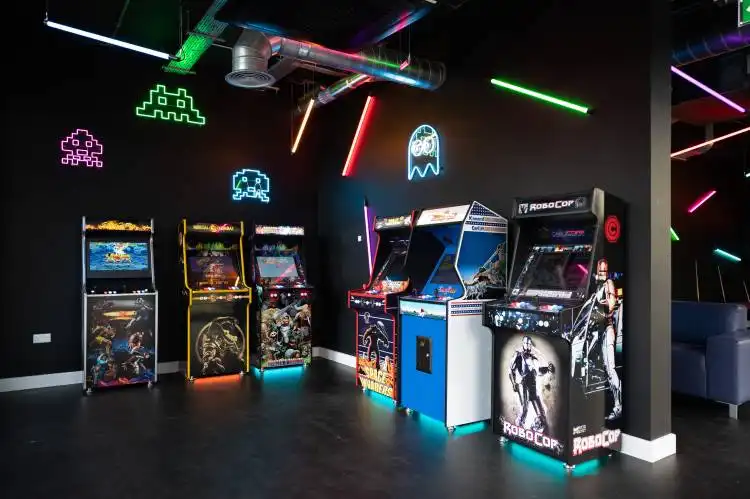Start a Game Center Business
Turning Pixelated Dreams Into Profitable Reality
| Updated


GAME CENTER BUSINESS
A Game Center business is a tantalizing trip in the playground for those with a fondness for virtual reality. Here, you'll be converting nostalgia into profit by offering a haven for gaming enthusiasts seeking the camaraderie and competitive vibe that only a communal gaming atmosphere provides. Video games, arcade challenges, Virtual Reality encounters - your business menu reads like every gamer's dream! It's not 'just child’s play', it’s an innovative business venture that bridges generations together under the identical banner of fun and amusement.
Jump to Business Plan
RELATED BUSINESS IDEAS
Browse ALL Hospitality & Leisure Ventures Business Ideas
Discover Your Perfect Domain
Unlock the door to your online success with our hand-picked selection of premium domain names. Whether you're starting a new venture or rebranding an existing one, the right domain can set the tone for your digital presence. Browse through our curated list, each with its unique potential to enhance your brand's visibility and credibility.
GAME CENTER MINI BUSINESS PLAN
This a quick reality check to help you identify the strengths and weaknesses of your business concept before you dive in.
Expected Percent Margin:
- Gross Margin: 60-75%
- Net Profit Margin: 15-25%
Earnings Expectations:
- Daily Earnings: $400 - $800
- Weekly Earnings: $2,800 - $5,600
- Monthly Earnings: $12,000 - $24,000
- Annual Earnings: $144,000 - $288,000
Actions to Hit Those Numbers:
Equipment Purchase and Maintenance:
- Initial Investment: Approximately $50,000 - $100,000 for high quality gaming equipment, sound systems, consoles, and comfortable furnishings.
- Regular Maintenance: Schedule for weekly equipment checks and necessary repairs/upgrades.
Staffing:
- Staffing: Employ at least 2-4 part-time staff who are well versed with the gaming culture and capable of troubleshooting common gaming issues.
Marketing and Customer Acquisition:
- Online Presence: Develop a functional, user-friendly website; active profiles on social media platforms like Facebook, Twitter, Instagram, where you can interact with the customers.
- Offline Marketing: Run local ads and organize small-scale events such as gaming competitions.
Cost Control:
- Utilities: Ensure electricity usage is minimized when the centre is not operational.
Business Operations:
- Open Hours: Open at least 6 days a week for 10-12 hours a day. Night hours are usually the busiest.
- Pricing Model: Offer multiple membership plans and hourly rates.
- Refreshments: Selling snacks and beverages can act as an additional source of income.
As with all business ventures, these estimates can vary based on location, overall investment, and how effectively the business is run. It's always advised to seek advice from a financial advisor for a more personalized business plan.
NOT WHAT YOU HAD IN MIND? Here are more ideas



Browse ALL Hospitality & Leisure Ventures Business Ideas
Grab Your Business Website Name
Before you get caught up in the whirlwind of setting up your business, invest in a domain name. It's a small but significant step that lays the foundation for your brand and makes it easier for customers to find and trust you. Just like you wouldn't build a house without securing the land first, don't build a business without securing your domain name.
"Why? Can't that wait?" Here's why it shouldn't
Step 1: Determine if Starting a Game Center Business is Right for You
Breakdown of Startup Expenses
Before starting a game center business, it is important to understand the startup expenses associated with the endeavor. These expenses can include the cost of renting or purchasing a space, the cost of purchasing and maintaining gaming consoles and other equipment, the cost of hiring staff, and the cost of marketing and advertising. Additionally, it is important to consider the cost of any licenses or permits that may be required to operate a game center business.
Breakdown of Ongoing Expenses
In addition to the startup expenses, it is important to understand the ongoing expenses associated with running a game center business. These expenses can include the cost of utilities, the cost of replacing and maintaining gaming consoles and other equipment, the cost of hiring and training staff, and the cost of marketing and advertising. Additionally, it is important to consider the cost of any licenses or permits that may be required to operate a game center business.
Examples of Ways to Make Money
There are several ways to make money with a game center business. The most common way is to charge customers a fee for playing games. Additionally, game centers can make money by selling snacks and drinks, renting out gaming consoles and other equipment, and offering special events and tournaments. Additionally, game centers can generate revenue by offering memberships, hosting birthday parties and other special events, and partnering with other businesses.
Step 2: Name the Business
When naming your game center business, it is important to choose a name that reflects the type of services you will be offering. Consider using words such as “gaming”, “arcade”, or “center” to make it clear what your business does. Additionally, make sure the name is easy to remember and pronounce. You may also want to consider the potential for a website domain name and social media handles when selecting a name. It is also important to make sure the name is not already in use by another business. You can check with your local government to make sure the name is not already registered. Additionally, you may want to consider trademarking your business name to protect it from being used by another business.
Step 3: Secure Financing
Securing financing for your game center business is an important step in the process. There are several sources of financing available to entrepreneurs, including traditional bank loans, angel investors, venture capital, and crowdfunding. Bank loans are the most common form of financing, but they often require a good credit score and a detailed business plan. Angel investors and venture capitalists are another option, but they usually require a large stake in the business. Crowdfunding is a newer option that can be used to raise money from a large group of people.
Writing a Business Plan
Writing a business plan is essential for securing financing. A business plan should include an executive summary, a description of the business, a market analysis, a competitive analysis, a description of the product or service, a marketing plan, an operations plan, a financial plan, and an appendix. The executive summary should provide an overview of the business, the market analysis should provide an analysis of the current market conditions, and the competitive analysis should provide an analysis of the competition. The product or service description should provide a detailed description of the product or service, the marketing plan should provide a detailed plan for marketing the product or service, the operations plan should provide a detailed plan for running the business, and the financial plan should provide a detailed plan for financing the business. Finally, the appendix should provide any additional information that may be relevant to the business.
Step 4: Find a Location
When selecting a location for a game center business, it is important to consider the size of the space, the cost of rent, the availability of parking, the local competition, and the demographics of the area. It is also important to consider the visibility of the location, as well as the ease of access for customers. Additionally, the zoning laws of the area should be taken into account, as some areas may have restrictions on the type of business that can be operated.
How to Find a Suitable Location
Once the factors to consider have been identified, the next step is to find a suitable location. This can be done by searching online for available properties or by contacting a real estate agent. It is also important to visit the potential locations in person to get a better understanding of the area and the potential customer base. Additionally, it is important to research the local competition to ensure that the game center business will be able to stand out in the area.
Negotiating a Lease
Once a suitable location has been identified, the next step is to negotiate a lease. This should include a breakdown of the rent, the length of the lease, and any additional fees or restrictions. It is important to read the lease carefully and to understand all of the terms and conditions before signing. Additionally, it is important to consider the potential for future expansion when negotiating the lease.
Securing the Location
Once the lease has been negotiated, the next step is to secure the location. This can be done by obtaining the necessary permits and licenses, as well as by purchasing any necessary equipment or supplies. Additionally, it is important to ensure that the location is properly insured and that all safety regulations are met. Finally, it is important to create a business plan and to secure any necessary financing before opening the game center business.
Step 5: Obtain Licenses and Permits
In order to start a game center business, there are certain licenses and permits that must be obtained. Depending on the state and local laws, the types of licenses and permits required may vary. Generally, a business license, a sales tax permit, and a zoning permit are required. Additionally, depending on the type of games offered, a gaming license may also be required. It is important to research the specific licenses and permits required in the area in which the business will be located.
Applying for Licenses and Permits
Once the necessary licenses and permits have been identified, the next step is to apply for them. The process for applying for licenses and permits will vary depending on the state and local laws. Generally, the application process involves submitting an application form, providing proof of identity, and paying a fee. Additionally, some states may require a background check or additional documentation. It is important to research the specific application process for the area in which the business will be located.
Cost of Licenses and Permits
The cost of licenses and permits will vary depending on the state and local laws. Generally, the cost of a business license is relatively low, but the cost of a gaming license may be significantly higher. Additionally, some states may require an annual fee for certain licenses and permits. It is important to research the specific cost of licenses and permits in the area in which the business will be located.
Timeframe for Obtaining Licenses and Permits
The timeframe for obtaining licenses and permits will vary depending on the state and local laws. Generally, the application process can take anywhere from a few days to a few weeks. Additionally, some states may require additional processing time for certain licenses and permits. It is important to research the specific timeframe for obtaining licenses and permits in the area in which the business will be located.
Step 6: Purchase Equipment
When starting a game center business, there are a few pieces of equipment that are necessary. This includes gaming consoles, gaming PCs, gaming chairs, and a variety of games. It is important to purchase the right type of equipment to ensure that customers have a great experience. Additionally, it is important to purchase equipment that is reliable and will last a long time.
Where to Purchase Equipment
When it comes to purchasing equipment, there are a few different options. One option is to purchase equipment from a local retailer. This can be a great option if you are looking for a more personalized experience. Another option is to purchase equipment online. This can be a great option if you are looking for a more cost-effective option. Finally, you can also purchase used equipment from online auction sites or from other game centers.
Cost of Equipment
The cost of equipment will vary depending on the type of equipment you are purchasing. Generally, gaming consoles and PCs will be the most expensive pieces of equipment. Additionally, the cost of games will also vary depending on the type of game. It is important to research the cost of the equipment before making any purchases.
Financing Options
If you are unable to purchase the equipment outright, there are a few financing options available. One option is to apply for a business loan. This can be a great option if you have good credit and are able to secure a loan with a low interest rate. Another option is to use a business credit card. This can be a great option if you are able to pay off the balance in a timely manner. Finally, you can also look into leasing options. This can be a great option if you are looking for a more cost-effective way to purchase the equipment.
Step 7: Market the Business
When it comes to marketing a game center business, there are a variety of strategies that can be used. Social media is a great way to reach potential customers, as it is free and easy to use. Creating a website and using SEO techniques can also help get the word out about the business. Additionally, traditional marketing methods such as print and radio ads can be used to reach a wider audience. It is important to research the target market and determine the best way to reach them.
Establish a Brand
When marketing the business, it is important to establish a brand. This includes creating a logo, slogan, and mission statement that will be used to represent the business. This will help customers to recognize the business and differentiate it from competitors. Additionally, creating a loyalty program and offering discounts can help to increase customer loyalty.
Promote Special Events
Promoting special events is another great way to market the business. This can include hosting tournaments, offering discounts for large groups, or offering special deals for holidays. Additionally, offering special events such as game nights or movie nights can help to draw in customers.
Network with Other Businesses
Networking with other businesses in the area can also be beneficial. This can include partnering with local restaurants or hotels to offer discounts or packages to customers. Additionally, partnering with other businesses in the gaming industry can help to increase exposure and attract more customers.
Step 8: Hire Employees
When hiring employees for a game center business, it is important to find individuals who have the right skills and attitude for the job. It is also important to ensure that the employees have the necessary certifications and licenses, depending on the type of business. When looking for employees, it is important to look for individuals who have experience in the gaming industry, as this will help the business run more smoothly. Additionally, it is important to find employees who are passionate about video games and customer service, as this will help create a positive atmosphere in the game center.
Benefits of Hiring Employees
Hiring employees can be beneficial for a game center business in a variety of ways. For one, having employees can help the business run more efficiently and effectively. Employees can help manage the game center and ensure that customers are having a positive experience. Additionally, having employees can help the business save time and money, as employees can take on tasks that would otherwise take up a lot of time. Finally, having employees can help the business grow, as they can help manage more customers and create a more positive atmosphere in the game center.
Step 9: Open for Business
Opening day is a big milestone for any business, and a game center is no exception. To ensure a successful opening day, there are a few tips to keep in mind. First, make sure to advertise the opening of the business. This can be done through word of mouth, social media, or even traditional advertising methods. Second, make sure to have plenty of staff on hand to help customers. This will help to ensure that customers have a positive experience and will be more likely to return. Third, make sure to have plenty of games and activities available for customers. This will help to keep customers engaged and entertained. Finally, make sure to have a plan in place for any potential issues that may arise. This will help to ensure that any issues are quickly and efficiently addressed.
Ongoing Maintenance
Once the game center is open for business, there are a few steps to take to ensure that the business runs smoothly. First, make sure to keep up with maintenance of the games and activities. This includes regular cleaning and repairs to ensure that everything is in working order. Second, make sure to keep up with customer service. This includes responding to customer inquiries and complaints in a timely manner. Third, make sure to stay up to date with the latest trends in the gaming industry. This will help to ensure that the game center is offering the latest and greatest games and activities. Finally, make sure to review customer feedback and make changes as needed. This will help to ensure that customers are having the best experience possible.
EXPLORE MORE CATEGORIES
Browse ALL Business Idea Categories
TAKE THE NEXT STEPS










